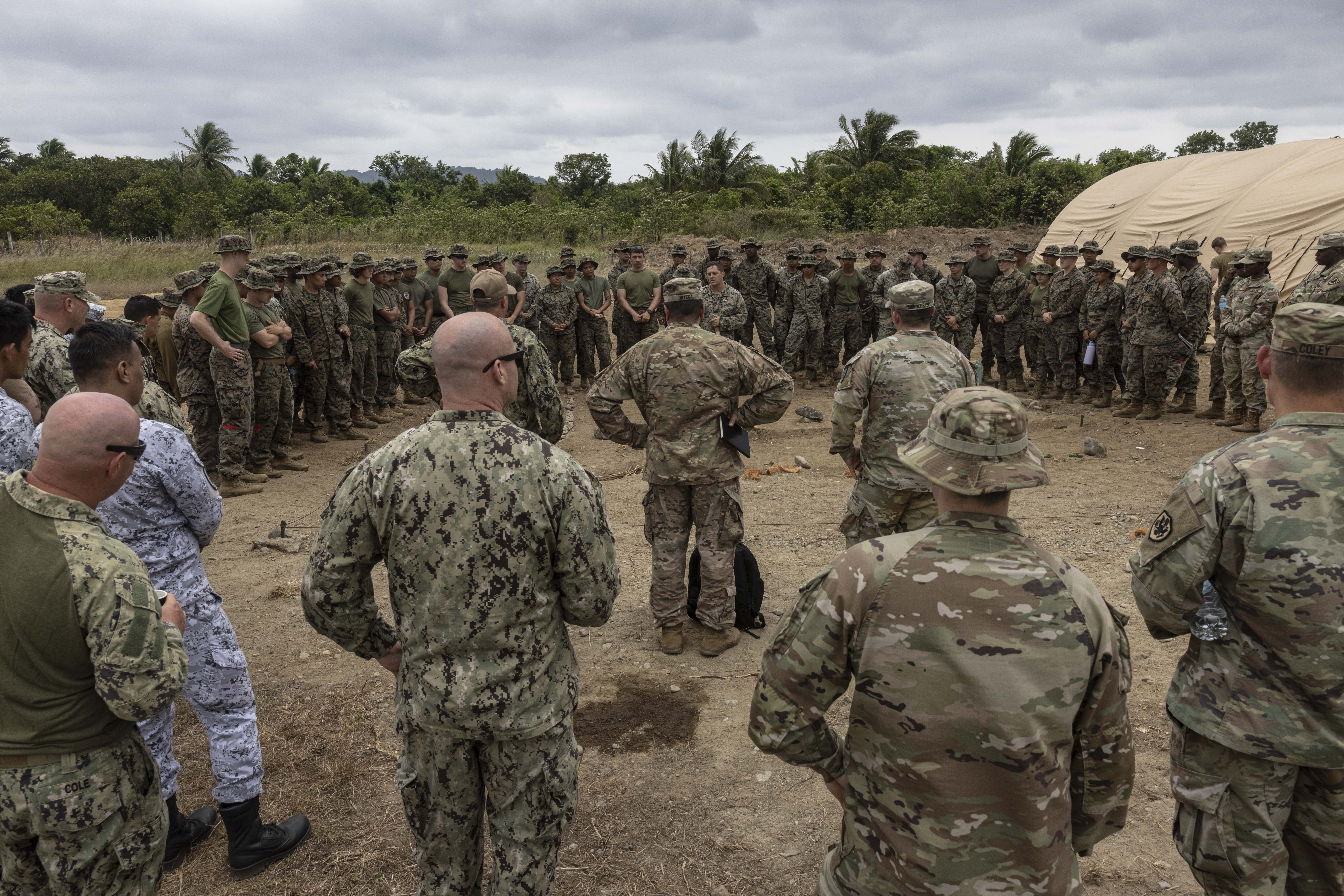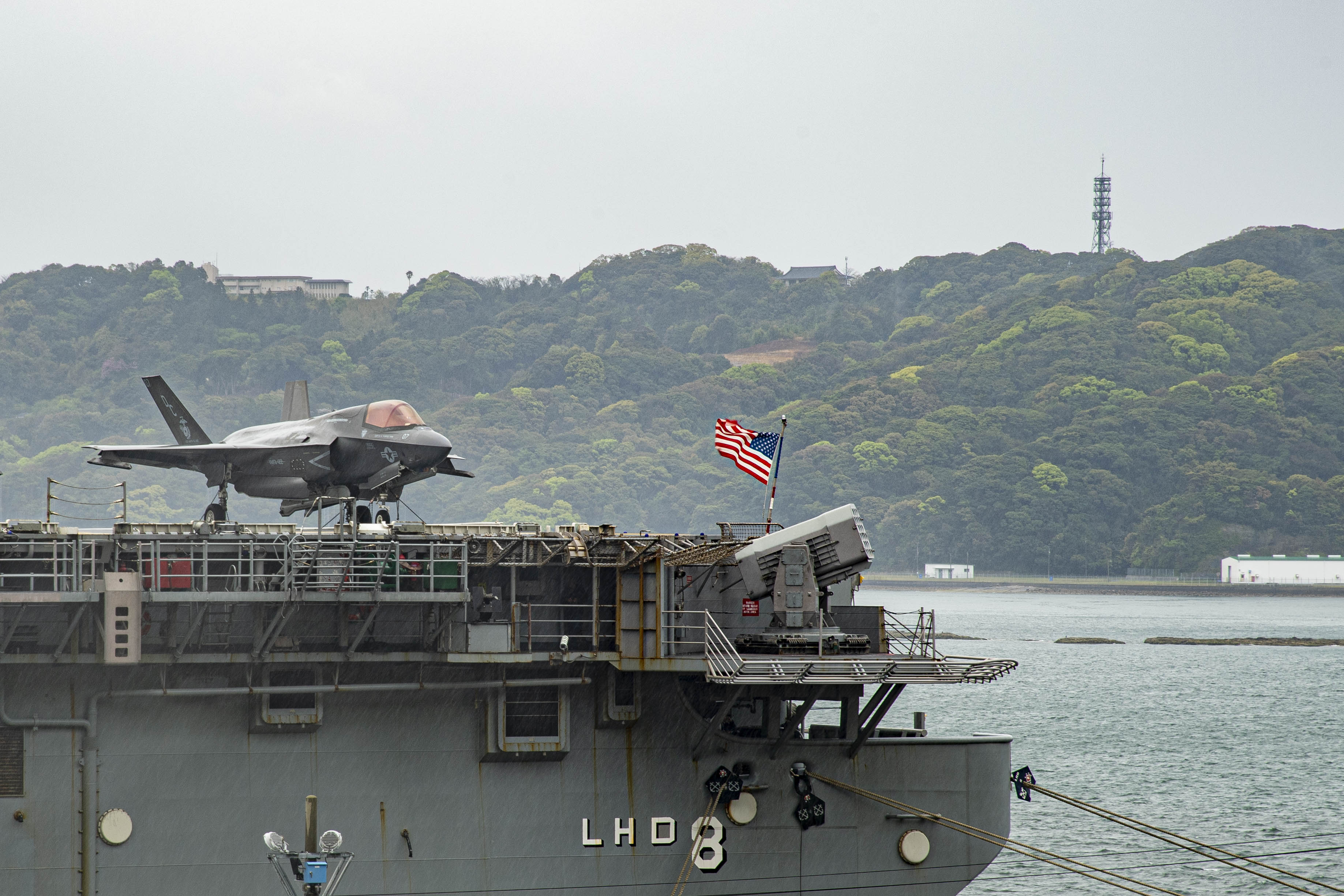
MANILA – The Philippines and the United States began the largest iteration of Balikatan, the annual military exercise involving Filipino and American troops, during a Tuesday ceremony at the Philippine military’s general headquarters of Camp Aguinaldo in Quezon City.
Armed Forces of the Philippines Chief of Staff Gen. Andres Centino opened the exercise on Tuesday as defense and foreign affairs officials also met for the 2+2 Ministerial Dialogue in Washington D.C., to discuss the direction of the alliance between the two countries.
“For the Armed Forces of the Philippines, in particular, this year’s Balikatan Exercise is most timely as we fast-track the enhancement of our capabilities for maritime security and domain awareness, as well as our employment concept of newly acquired equipment and weapon systems under our modernization program and application of newly developed doctrines – with the end-in-view of projecting a credible defense posture,” Centino said.
More than 17,600 American, Filipino and Australian sailors, Marines, soldiers and airmen will participate in the exercise, Enrique Manolo, secretary of foreign affairs, said in Washington, D.C., on Monday at the Center for Strategic and International Studies.
The exercise illustrates the importance Manila places on internal security, Manolo said, and signifies another step in modernizing the more than 70-year-old alliance between the United States and the Philippines.
The increased emphasis on interoperability required to address new security challenges, primarily coming from Beijing, facing the alliance allows Manila “to shore up our defensive posture.”
“Balikatan provides unparalleled opportunities to demonstrate the strength and readiness of the Philippine-U.S. security alliance,” Lt. Col. Daniel Huvane, Balikatan Combined Joint Information Director, said in a news release from the American embassy in Manila.
Last year’s drills saw about 9,000 military participants in the annual exercise that began in 1991.
Philippine military public affairs office chief Col. Jorry Baclor said the 38th iteration of the bilateral exercise highlights four major events – a command post exercise, cyber defense exercise, field training exercise and humanitarian civic assistance.
Weeks before the exercise, the Philippine military said that this year’s phase would be the biggest, as U.S. armaments will even be in full use, including the Patriot and Avenger missiles and HIMARS.
This coming Thursday, U.S. and Filipino troops will also conduct a live firing of the U.S. anti-tank weapon Javelin, still as part of the recently concluded phase one of the U.S.-Philippines “Salaknib” exercise, which involved the Philippine Army and the U.S. Army in the Indo-Pacific, according to Philippine Army spokesman Col. Xerxes Trinidad.

An F-35B Lightning II Joint Strike Figther, assigned to Marine Fighter Attack Squadron (VMFA) 122, 13th Marine Expeditionary Unit, sits parked on the amphibious assault ship USS Makin Island (LHD 8) during a scheduled port visit at Commander, Fleet Activities Sasebo April 5, 2023. US Navy PhotoOn the eve of Balikatan’s opening, Filipino and American soldiers trained together in “bunker and room-clearing” operations as part of the opening salvo at Fort Magsaysay in Nueva Ecija.
“This year’s Balikatan will be the biggest ever, an indication of the growth of our alliance and how it continues to evolve to meet our shared goals,” Heather Variava, U.S. Chargé d’affaires in Manilla said on Tuesday.
Baclor said the participating forces will enhance their joint and combined capabilities in maritime security, amphibious operations, live-fire exercise, urban operations, aviation operations, counter-terrorism, and humanitarian assistance and disaster response.
The Philippines emphasized the importance of Balikatan to both U.S. and the Philippine forces, as Licudine said it builds “interoperability, enhances capabilities, and demonstrates mutual defense of the Philippine sovereign territory.”
U.S. Defense Secretary Lloyd Austin declared: “Balikatan is an important opportunity to train shoulder-to-shoulder and build trust and confidence that enable our forces to respond to crises and contingencies as a team.”
In Washington D.C., Filipino Department of National Defense Officer in Charge Carlito Galvez and Enrique Manolo held the 2+2 meeting with Austin and U.S. Secretary of State Anthony Blinken.
The U.S. State Department in a statement issued ahead of the meeting said Blinken and Austin would reaffirm Washington’s ironclad commitment to its alliance with the Philippines, which it said has “contributed to peace, stability and prosperity in the Indo-Pacific.”
Speaking at CSIS on Monday, Manalo reiterated the distance between the Philippines and Taiwan – about 90 miles – where tensions have been rapidly rising between the United States and China over the future of the self-governing island.
Chinese naval militia continue to harass and ram Filipino fishermen working in the Philippines’ exclusive economic zone, he said. Beijing warships and coast guard vessels are ignoring a 2016 international tribunal’s ruling dismissing its claims to much of the South China Sea. The Chinese are treating the region as its sovereign territory.
Beijing has built at least seven artificial islands on coral reefs that are capable of supporting maritime operations and military airfields. One of those man-made islands is in the Spratlys, off the coasts of the Philippines, Malaysia and Vietnam.
Manolo added, “we feel the United States is an important partner” militarily and economically. He noted several times at the CSIS event the importance of the Enhanced Defense Cooperation Agreement with Washington in keeping the Indo-Pacific a safe and secure environment for maritime commerce. He indicated that the United States and other nations, possibly Japan and Australia, may soon begin conducting joint maritime patrol operations with the Philippines to secure its expansive ocean borders.
Manolo added that the Philippines has the fourth largest coastline in the world, and it’s hard to secure but vital to economic development.
The secretary added that Manila also looks to the Association of Southeast Asian Nations, or ASEAN, as a forum to resolve differences peacefully. The association is developing guidelines on acceptable international behavior and mechanisms to avoid conflict in territorial and trade disputes. China is a member.
Included in the Enhanced Defense Cooperation Agreement (EDCA)were arrangements for the United States to establish nine facilities for future American operations. He said he will discuss what activities will be allowed at the last four added in the arrangement during the meeting in Washington with his counterpart, Blinken, and the two nations’ secretaries of defense.
The “2 Plus 2” meetings had been shelved for seven years when then-President Rodrigo Duerte promised he’d shift security priorities away from the United States and more toward China to bolster Manila’s sovereignty in regional politics.
A September meeting in New York between President Joe Biden and newly installed President Ferdinand Marcos that led to the new defense agreement clearly demonstrated the shift back toward the United States.
“We obviously have to work [WITH?] them,” Manolo said, referring to China. “Equity in the maritime commons” is a foreign policy goal as Manila is “on the threshold” of becoming a regional economic power. He welcomed public and private assistance in filling infrastructure needs for future development and growth. He pointed to how important Manila can be in delivering clean energy renewables with investments made to explore its deposits of important raw earth and other green minerals.
“Multilateralism must thrive” to avoid conflict, said Manolo.
But “we want to make [discussions with China] compatible with the U.S. alliance.”





